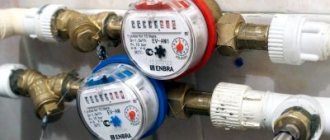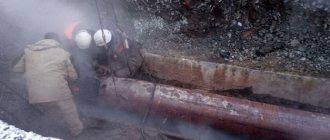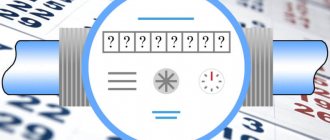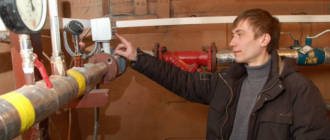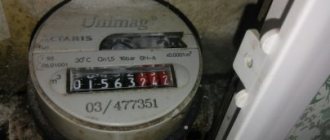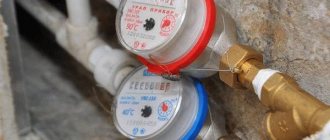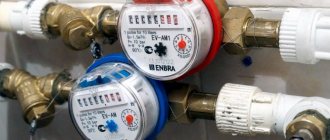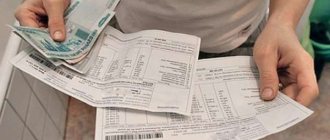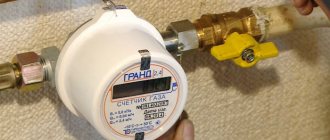Expert author of the article
Yulia Kuprina
Certified lawyer. Total work experience in the specialty is 13 years.
In most cases, installing metering devices on pipelines is beneficial. Current laws on water meters regulate the calculation procedure in the absence of water meters and in their presence. The amount to be paid in the first case may be significantly higher than when calculating by meters. In this article, we will look at the regulations in force in 2021, innovations, obligations of the apartment owner, sanctions and fines.
Legislation
The regulatory framework regarding the installation of water meters, as well as their use and verification is constantly updated and changed.
Local authorities can make changes to existing regulations and issue new acts that complement or expand the issues of operating water meters.
The general list of main acts is as follows:
- Federal Law No. 102-FZ of June 26, 2008 (hereinafter referred to as Federal Law No. 102-FZ), which establishes the unity of all measuring instruments and the protection of the rights and interests of citizens from inaccurate measurements.
- Federal Law No. 261-FZ of November 23, 2009 (hereinafter referred to as Federal Law No. 261-FZ), regulating the procedure for accounting for consumed resources using metering devices. In addition, it regulates the procedure for installing and commissioning meters, including water metering.
- Federal Law No. 416-FZ of December 7, 2011, which sets out all types of legal relations relating to the water supply system as a whole.
- Decree of the Government of the Russian Federation No. 776 of 09/04/2013, which describes issues related to the regulation of the procedure for accounting for water resources, as well as wastewater using water meters.
- Decree of the Government of the Russian Federation No. 306 of May 23, 2006. This regulatory act establishes the procedure for calculating payment for consumed services in the absence of a measuring device. The act establishes consumption standards.
- Decree of the Government of the Russian Federation No. 354 of 05/06/2011 (hereinafter referred to as RF PP No. 354). This document describes in detail how the fee for a meter is calculated, and also describes all other situations that may arise in the field of consumption of utility resources.
- Decree of the Government of the Russian Federation No. 603 of June 29, 2016. This document amends some acts regulating the provision of public services.
- Federal Law No. 496-FZ of December 27, 2019 “On Amendments to the Federal Law “On Ensuring the Uniformity of Measurements”. The point here is that now only electronic registration of meter verification results is valid. The digital verification record will be stored in a virtual database - the Federal Information Fund for Ensuring the Uniformity of Measurements (FIFOI) (also known as the FSIS "Arshin" register).
In addition to these documents, one should also mention Order of the Ministry of Energy of the Russian Federation No. 178 dated April 16, 2010, according to which all consumers were asked to install meters.
But already the Decree of the Government of the Russian Federation No. 344 of 04/16/2013 determined the introduction of increased coefficients from 01/01/2015 for consumers who have the opportunity to install a measuring device, but do not have instruments.
The full text of the Resolution can be found here.
Is verification canceled due to quarantine?
In 2021, due to the pandemic, a number of laws were changed. This also affected metering devices. During the quarantine in 2021, until January 1, 2021, verification of metering devices (in particular, water meters) ceased to be a mandatory procedure for individuals. You can carry out the procedure, the verification certificate is valid. But if you do not do the next verification in 2020, then they have no right to apply any sanctions to you.
The Government of the Russian Federation adopted Resolution 424 on this.
Read details about verification 2021 in a separate article.
On January 1, 2021, the moratorium ended. Now you still need to do the verification. Read what to do if you didn’t have time to do it in 2021 and the verification is overdue.
Is verification necessary?
It is imperative to check the integrity and safety of the water meter. The owner must independently notice the malfunction and contact the management company.
However, if he did not do this, but continued to pay for the consumption of the resource according to the readings of the faulty device, for the last six months his payments will be recalculated based on the number of people living in the apartment.
Attention! In some regions, the Government has accommodated users halfway. After all, it is quite possible that they did not know about the malfunction of the device and therefore did not report this fact. Here, recalculation occurs for just the last 3 months, and not for six months, which significantly reduces costs.
Differences by region are associated not only with the timing of recalculation, but also with consumption tariffs. So, for example, in Moscow 1 m3 of cold water costs 35.1 rubles, and in the provinces the cost is lower and varies between 20 - 28 rubles per 1 m3.
Is it necessary to install meters?
The mandatory installation of meters is enshrined in Federal Law No. 261-FZ dated November 23, 2009. Simultaneously with the entry into force of this act, changes were made to the Code of Administrative Offenses of the Russian Federation. In Art. 9.16, fines were added for persons responsible for the maintenance of apartment buildings in terms of non-compliance with the requirements for the installation of measuring instruments for the energy resources used. This does not mean ordinary homeowners, but management companies.
Clause 1 of Art. 13 in Federal Law No. 261-FZ establishes that all energy resources, including water, must be taken into account using special measuring instruments.
Paragraph 2 of the same law states that payment for energy resources should be made based on the data obtained by such measuring instruments.
These same conclusions are contained in Chapter VII of the Rules approved by the RF Government No. 354. At the same time, the norms of this document establish the mandatory commissioning of metering devices and this must be done no later than one month from the date of installation of the metering device. These requirements also apply to water meters installed on central water supply networks.
The general rules for installing water meters and putting them into operation are as follows:
- The water meter, like any other meter, must be put into operation. This must be done no later than one month from the date of its installation by submitting an application and the following documents:
- the application must contain: applicant data;
- type and location of installation of the water meter;
- data of the organization that installed it;
- actual readings on the date of installation;
- date of the next meter verification;
- After the water meter is put into operation, payments for wasted water, starting from the next month, will be based on its readings.
The fact that it is impossible to install metering devices must be recorded in an appropriate act. The form of this document, as well as the procedure, are determined by the Ministry of Construction and Housing and Communal Services of the Russian Federation.
Moreover, if the apartment owner does not install the meter, there will be no fines. But you will have to pay for water according to standards (which are initially too high) with an increasing factor. That is, the consumer will greatly overpay.
Water meter: insert into the water supply system
The complexity of installing a water meter largely depends on the material of the pipes that make up the water supply system. If the water supply is made of polypropylene pipes, then the adapter coupling is screwed into the check valve already connected to the union nut and fitting. Next, you need to solder it to the water supply using a special soldering iron or install it using fittings and glue.
Metal pipes are no longer particularly relevant now. It is advisable to connect the area with a polypropylene fitting and pipe, even if your wiring is not upgraded. To do this, you need to measure the length of the structure, retreat an additional 20-30 cm and cut the pipe with a hacksaw or grinder. Using a calibrator, you should restore the edges of the pipe, and then cut the threads on it with taps. Then connect this section with a polypropylene fitting and pipe. Another option is to insert the fitting into the check valve, and then connect it to the water pipe with a flexible stainless steel hose (dy=15, local length 0.5-1m). At the same time, you should not forget about packaging.
For a water pipe, the installed meter is quite heavy. That is why it is advisable to attach it to the wall using mounting clamps. To do this, you need to attach the corner to the sewer riser, mark the holes for the clamp, and then drill and secure it. We place the water meter on the corner and attach it to the connecting fittings.
I would like to believe that the overview of installing a water meter, which we provided above, will be useful to those who decide to independently understand the features of installing equipment of this type.
What the law says about checking and replacing meters
In accordance with Art. 13 Federal Law No. 102-FZ, all measuring instruments must be periodically verified during their use. To do this, each device is assigned its own verification period (interval). At the end of it, the water meter must either be verified or replaced with the same one with similar characteristics.
That is, further use of such a meter, as well as accounting for used water using it, is possible until the expiration of its calibration interval or its loss.
The verification date and frequency for each device are set by the manufacturer when carrying out certain tests. This information is indicated in the passport for the device.
When buying a water meter, it is important to pay attention to the date of initial verification. That is, if you buy a meter with an expiring date and install it, you will still have to recheck it or replace it soon.
Read details about the verification procedure.
The calibration interval for water meters is as follows:
- For cold water – 6 years.
- For hot water, this period is 4 years or 6 years (depending on the specific model).
This is due to the different chemical composition of water, which affects the wear of equipment.
The consumer must decide whether to change the meter or have it verified independently. According to statistics, only a small number of water meters undergo mandatory testing and, after the expiration of the verification interval, meet the stated requirements.
At the same time, the procedure for replacing a metering device in an apartment takes place in a shorter time and is accompanied by lower expenses.
Therefore, it is necessary to decide whether the meters need to be changed or examined based on the totality of all factors.
Operating hours of water meters
The service life of water meters is determined solely by the technical capabilities of a particular device. Such information is indicated by the manufacturer in the accompanying documentation. After its completion, you need to replace the device with a new one. Therefore, it is better to immediately choose a meter that has a long service life.
Important! There are work statistics. Imported hydrometers can be used for fifteen years. However, the service life of domestic devices is reduced and is approximately 5-8 years.
The law prohibits the use of a faulty device, but nothing is said about the time of use of the working device. Therefore, you can change the water meter after it breaks or at another convenient time.
Installation of smart meters from 2021
Since July 2021, the practice of installing intelligent systems for taking and monitoring readings has been introduced in the Russian Federation (draft bill No. 139989–7 of the Ministry of Construction and Housing and Communal Services). As an experiment, several regions of the Russian Federation are already installing such systems that control the consumption of consumed electricity. All necessary amendments to the laws on electricity have been made.
The issue of developing and installing similar systems in the water supply sector continues.
Activities for the installation of smart metering devices are carried out by the utility (resource supply) company. That is, the consumer does not need to pay for or purchase such a metering device.
A meter of this type transmits information to a data collection center via closed communication protocols. The history of readings is stored in the meter archive and in the database of the data collection center. Making changes to the readings for the specified device stored in the accounting center is excluded.
Many regions have already approved regulations according to which smart metering devices should be installed:
- In new apartment buildings put into operation.
- In houses after major renovations.
In addition, when designing and building houses, such systems should be included in the mandatory equipment.
